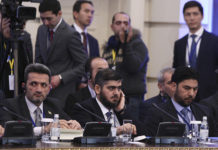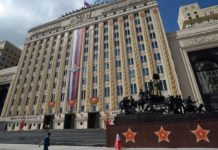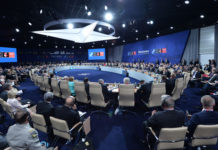US President had his first official meeting with a representative of Russia in the person of Foreign Minister Sergei Lavrov. Earlier, according to results of the meeting of Russian Deputy Foreign Minister Sergei Ryabkov with US Deputy Secretary of State Thomas Shannon it was reported that normalization of relations of the two countries was possible but for this purpose it was necessary to eliminate “a whole group of acute irritants created by the previous administration of Barack Obama.”
US president Donald Trump received Russian foreign minister Sergei Lavrov
US President had his first official meeting with a representative of Russia in the person of Foreign Minister Sergei Lavrov. Earlier, according to results of the meeting of Russian Deputy Foreign Minister Sergei Ryabkov with US Deputy Secretary of State Thomas Shannon it was reported that normalization of relations of the two countries was possible but for this purpose it was necessary to eliminate “a whole group of acute irritants created by the previous administration of Barack Obama.”
The only “irritant” mentioned in the official account of the Russian Foreign Ministry in Facebook was “actual expropriation of objects of diplomatic representative offices of Russia in the US being our state property and having immunity.” The matter is evidently about residential centers of the Russian permanent representative office in New York and Russian Embassy in Washington. At the end of the last year, Americans closed access to them. Thirty-five Russian diplomats were extradited from the US simultaneously.
It is quite understandable that declaring of diplomats non grata persons or closing of access to real estate objects cannot be considered the reason of a serious chilling down of Russian-American relations. Actions of the Obama Administration became rather a derivative of the systemic crisis in these relations and resulted from it. There exist more serious irritants. For example, this is merger of Crimea with Russia and hostilities in Donets Basin. Or anti-Russian sanctions implemented because of this. Or the “Magnitsky list.” Or actions of both the US and Russia that generate endless mutual claims.
Finally, there exists the basic conflict. In Russia it would be characterized as unwillingness of Washington trying to play the role of global hegemon to tolerate the will of Moscow for sovereignty. In turn, the US would speak about unwillingness of the Russian authorities to follow the accepted norms of democracy and its intention to revive the Soviet empire.
However, after the meeting of official representatives of foreign ministries of the two countries the parties speak about expropriation of real estate and not about the obvious points of tension. Of course, it is possible to attribute this to peculiarities of the diplomatic discourse but diplomacy follows a preset general course and Ryabkov does not tell Shannon, “Relations will become normal if you stop supporting terrorists in Syria” and Shannon does not demand immediate “sopping of arming of militiamen from DNR and LNR.”
If such statements and demands sounded this would mean that the parties were inclined to continuation of the conflict and used the meeting to emphasize this in public. In turn, emphasis on details that are consequences and not reasons of chilling down of relations says that the countries are considering a defreeze and the current state of affairs have made everyone tired already. Steps like closing of access to real estate or withdrawal from some agreement are not irreversible and are often taken exactly for creation of a field in which it is possible to demonstratively back off without touching of common colliding interests. This can be called a policy of excessive bad steps that allows turning back and creating a visibility of progress.
Quite recently, we saw an example of quick defreeze in relations between Russia and Turkey. Erdogan could apologize immediately after death of the Russian pilot, start investigation, conduct arrests and pay compensation. Moscow could abstain from closing of the market for Turkish tomatoes. Enough of such excessive bad steps were taken including accusations of Ankara of cooperation with terrorists from the IS (prohibited in Russia).
At present, normalization of relations between Moscow and Ankara is confined to gradual revision of surplus bad steps. Along with this, fundamental disputes, for example, about Syria and Assad remain. In case of the US the logic of reconciliation may be approximately the same.














